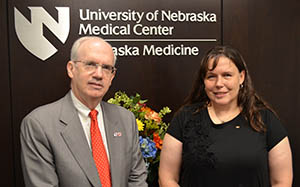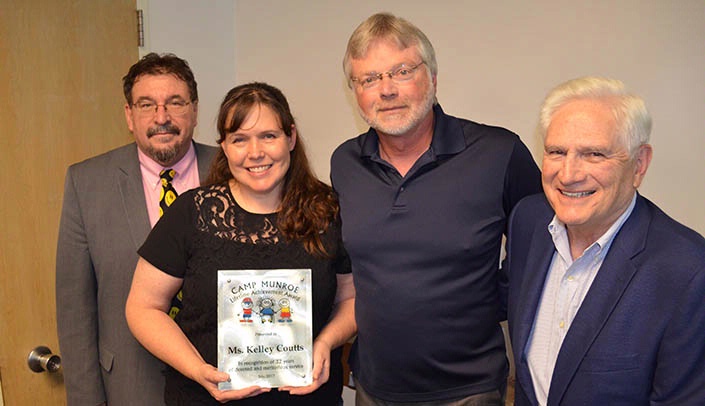Kelley Coutts was volunteering at a special education class at Westside High School in 1985 when her counselor pointed her to a volunteer opportunity at the Munroe-Meyer Institute’s Camp Munroe. She stayed for more than three decades.
Coutts, who is stepping down as associate director of the MMI Department of Recreational Therapy and as the director of Camp Munroe to relocated to Florida, reflected on her more than 30 years at camp — a place that led her to a college major, a job, a career — in fact, to a lifelong vocation that she intends to continue even after she leaves MMI.
 |
UNMC Chancellor Jeffrey P. Gold, M.D., congratulated Coutts on her career at UNMC and MMI. |
At the time, Coutts had never heard of recreational therapy, but once she discovered the degree, she transferred to the University of Nebraska at Omaha and changed her major.
Throughout her education, she continued to work at Camp Munroe, and once she graduated, she came to MMI fulltime, eventually rising to direct the camp where she had once volunteered.
Looking back, Coutts is proudest of the many staff and volunteers she has shepherded through the program.
“All of these people are going out into the world and advocating for people with developmental disabilities in a way that many other advocates may not be able to, because they have actually worked with individuals with disabilities for an extended amount of time,” Coutts said. “We have people who start volunteering when they’re 13 and stay until they’re 21 and beyond. They really are invested, and they then are able to take that experience and share it with others and to infuse this experience into their jobs.”
Many camp staff and volunteers go on to work in occupational therapy, physical therapy, education, psychology, nursing and medicine.
“It’s amazing how this experience can help guide people to where they want to be as an adult,” Coutts said.
Over her time at MMI, Coutts has seen the program and the institute grow.
“There has been such an investment in growing Munroe-Meyer and seeing the potential of what we can do, not only for families today, but also families in the future, with all the research and things that go on,” she said. “But what is so amazing about this place is that the spirit of what Hattie B. Munroe started is still infused into this place. It is about helping the families and the individuals, helping them find ways to reach their maximum potential.”
Coutts hopes to transplant that spirit to Florida, where she is moving with her husband.
“All the things I have learned here, all the experiences I’ve had, not only within my department but within UNMC as a whole, I will be able to take all this and hopefully be able to transfer it to another program,” she said. “I will be able to be an advocate and maybe help some other programs grow in new ways.”
“This has truly been the greatest adventure,” she said.
Michael Crawford, Ph.D., noted that during her MMI tenure, Coutts has “quite literally helped raise an entire generation of participants.
“These are people who started at age 3 who are now young adults in their 20s and 30s,” Dr. Crawford said. “This is why losing her is such a great loss for the department — she has encyclopedia-like knowledge of so many of our participants.
“She is also our walking historian for the department, and these are intangibles you simply can’t replace,” he said. “Add to that a tremendous work ethic and sense of advocacy for both the department and the institute and you can begin to understand why Kelley’s leaving is almost like a death in the family for those of us who have worked so closely with her for so many years. We of course wish her well in this new chapter in her life but we also wish it wasn’t so.”
MMI Director Karoly Mirnics called Coutts an essential part of MMI’s history.
“Kelley is a passionate, caring advocate, and she will be greatly missed,” he said. “We wish her the best with her future goals and hope to keep in touch as she finds new challenges.”
